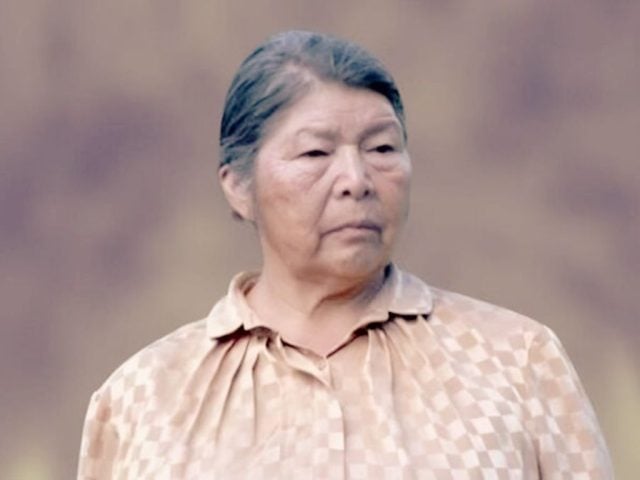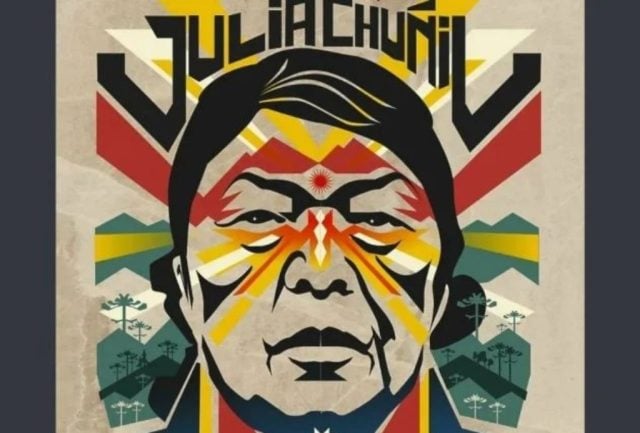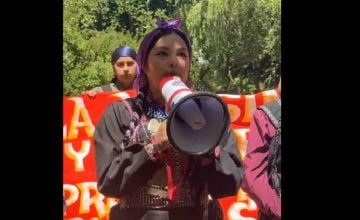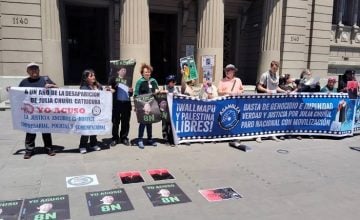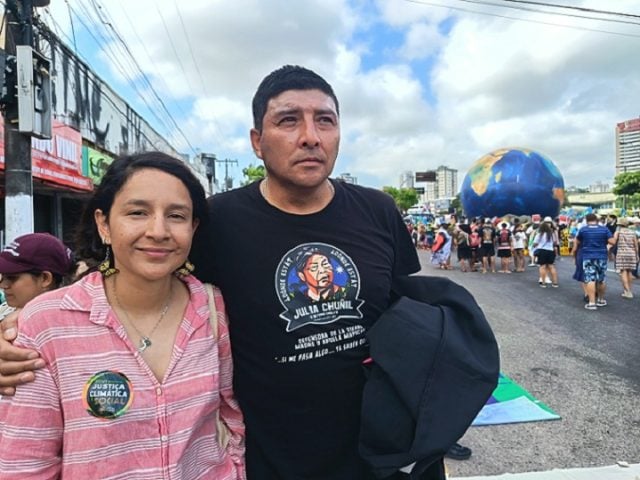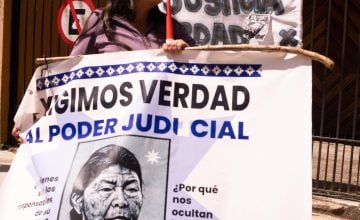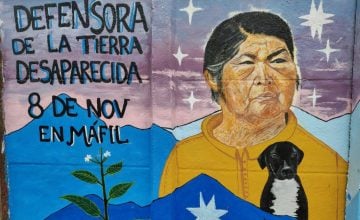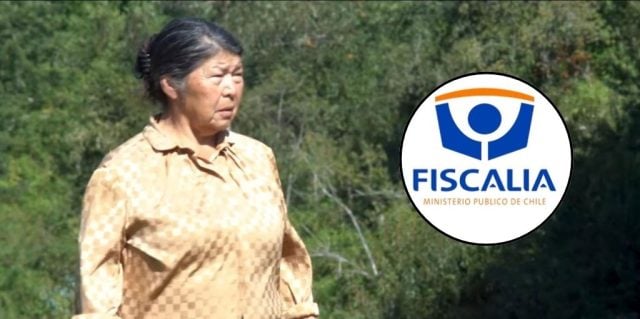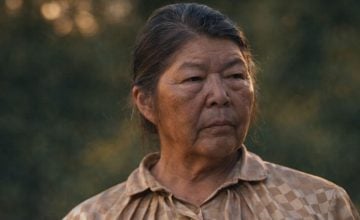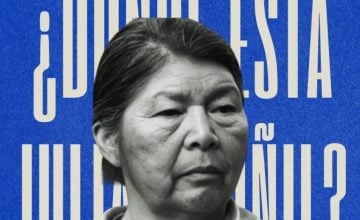Original article: A un año sin Julia Chuñil: la defensora del bosque mapuche que aún no aparece
One Year Since Julia Chuñil’s Disappearance: The Mapuche Forest Defender Still Missing
On November 8, it marks a year since the disappearance of Julia Chuñil Catricura, a Mapuche leader and environmental defender from the Los Ríos Region. On that day, the 73-year-old woman left her rural home in Máfil with her dog Cholito to search for her lost animals. Since then, neither has been heard from again.
Máfil, located in the Valdivia Province, is an area with a strong Mapuche-Huilliche presence. Its name comes from the Mapudungún language, meaning «embraced by rivers,» referencing the confluence of the Iñaque and Máfil rivers that give rise to the Pichoy River. Within this spiritual and natural setting, Chuñil led the Putreguel indigenous community, dedicated to protecting native forests and defending their territory.
When Julia’s family noticed her absence, they immediately organized search efforts. During these activities, they found significant clues, such as tire marks on the ground. However, one of her sons reported that these pieces of evidence were neither preserved nor considered by the investigation.
One year after her disappearance, the investigation has primarily focused on Julia Chuñil’s family environment. Despite the community’s insistence on exploring possible links to the territorial conflict she was involved in with a logging businessman, no visible progress has been made in that direction.
“The hypothesis that she got lost doesn’t exist for us; my mom was taken from here. Truck tracks were found in this area,” declared Pablo San Martín, Chuñil’s son, to the community television channel Señal 3 La Victoria in February of this year.
For over a decade, Julia Chuñil dedicated her life to defending the territory and native forest in the Máfil area. Her leadership in the recovery of Mapuche lands led her to confront a prolonged conflict with a logging businessman, marked by tensions and harassment claims.
A Woman of Land, Forest, and Resistance
Pablo San Martín Chuñil describes his mother as a humble and hardworking individual who fought for the rights of ancestral lands of the Mapuche people over the last 10 years.
“She was a defender of those forests; she wanted to have a farm where she could raise her animals and live peacefully. She never thought she would face problems because she entered a land recovery effort peacefully,” her son declared to DW.
Reserva Cora was the name of the over 900-hectare land located in a forested area that has been disputed for over 15 years. Between 2011 and 2015, an indigenous community sought to acquire it from a logging businessman through a process known as indigenous land reivindication, which even had the support of the National Corporation for Indigenous Development (CONADI).
However, there were irregularities in the process that led the Supreme Court to invalidate the purchase and return the land without notifying Chuñil, who, since 2014, chose to protect a section of indigenous territory, settling on the property and dedicating herself to its conservation.
Chuñil’s defense of this land prompted a confrontation with the businessman over the property, resulting in various episodes of alleged harassment and aggression. Among the complaints made by the defender at the time were an attempted hit-and-run, offers of money to abandon her claims, and the sabotage of a bridge that Chuñil used to navigate the forest.
According to her family, following this, the defender disappeared, believing that the Mapuche community could not achieve autonomy without the recognition of their territories.
“My mother was born and raised in this region of Chile. Her land was her life, and she worked tirelessly to preserve it. If a single tree was cut down, she knew. She knew this land like the back of her hand. And she didn’t want to go anywhere else,” San Martín told Global Witness.
It is because of her defense of the territory that Julia Chuñil has become a symbol of environmental protection and community resistance. Following her disappearance on Friday, November 8, hundreds participated in search operations. Additionally, thousands took to the streets demanding answers about the whereabouts of the environmental defender. During these months of absence, a bill has also progressed that establishes protective measures for those who defend human rights in environmental matters.
“Julia Chuñil is recognized as an environmental defender linked to the protection of ancestral territories and culturally significant sites currently under the control of landowners and loggers,” declared Pablo San Martín’s lawyer, Karina Riquelme, to Radio U Chile.
A Search Marked by Silence
On November 8, Julia and her dog Cholito lost track. That day, the environmental defender traveled to the «Reserva Cora Número Uno-A» to locate some lost animals. A neighbor witnessed her last appearance: the 73-year-old woman was heading toward a hill with an axe in hand, accompanied by her dog.
Later, on Sunday, November 10, Julia’s family grew concerned upon noticing her absence. They went to her home to invite her to lunch but were informed by a neighbor that she had not returned. One of her sons followed some tracks he found, also discovering unusual truck tire marks in the area, which led them to fear that their mother might have been intercepted while moving.
The next day, Chuñil’s family filed a missing persons report. Since then, family and neighbors initiated an intense search for several days. Volunteers, familiar with the territory just like Julia, were the first to point out that the environmental defender may have been taken from the area.
It wasn’t until December 10, coinciding with International Human Rights Day, that President Boric and Deputy Human Rights Minister Daniela Quintanilla verbally announced the allocation of resources to intensify the search. The President acknowledged that Julia, as the environmental defender of her community, deserves state protection in line with obligations set by the Escazú Agreement.
Seven months after Julia Chuñil’s disappearance, her children’s lawyers reported irregularities in the investigation, including delays, constant turnover of prosecutors, leaks of information, and abusive searches by police officers. They alleged that the family had been treated as suspects rather than victims and demanded respect for procedural guarantees and protection protocols for human rights defenders.
At that time, due to these unlawful pressures and rights violations, the legal representatives of Jeannette, Pablo, and Javier Chuñil filed a writ of protection against those responsible for illegal actions during the investigation.
It is worth noting that this writ of protection was presented against the Public Ministry, Carabineros, and the Police Investigations, arising after the search and entry conducted on the home of one of Chuñil’s daughters on January 30. However, in June of this year, the Valdivia Court of Appeals unanimously rejected the writ, ruling that the action had not been illegal.
According to the family’s lawyer, Karina Riquelme, since Julia Chuñil’s disappearance, the case has been characterized by alleged violations of the fundamental rights of those affected, who have received «discriminatory treatment, poor communication with the prosecution, and leaking false information to the press,» the lawyer told Mongabay Latam.
In July of this year, the case of Julia Chuñil reached the Inter-American Commission on Human Rights (IACHR), which urged the Chilean State to take urgent measures to avert greater risks for both the defender and her family.
In that instance, the family of the environmental leader of her community reported various actions of the prosecutor’s office. Among the reported situations are seven aggressive raids on the home of Chuñil, inhabited by her children Javier and Jeanette Troncoso, who recounted that they had been subjected to interrogations and pointed out as potential perpetrators of their mother’s disappearance, all accompanied by intimidating behavior from officials.
Furthermore, the family members warned of flaws in the investigation, such as alleged errors in the use of ground-penetrating radar and the exclusion from search tasks. They also indicated that there were pending actions like the seizure and examination of phones and vehicles of the main suspect in the family related to the territorial dispute with Julia.
This person is Juan Carlos Morstadt, a logging businessman with whom Chuñil had a conflict since 2015 over forest protection, and whom she accused of harassing her to abandon the territory.
Despite this, the lawyers and family of Chuñil have stated that authorities have maintained a line of investigation against her family, as well as leaked information to the press following that same line, supposedly without supporting evidence. They argue that the authorities have not taken into account Julia Chuñil’s role as an environmental defender.
“They have searched my siblings’ house as if they had something to hide, and that has diverted the focus of the investigation from the individuals who are actually guilty,” San Martín told Global Witness.
According to the family’s defense, the only evidence against them comes from a witness whose identity remains confidential, claiming to have seen Chuñil’s children set fire to their clothes.
In August, the director of the INDH, Yerko Ljubetic, met with National Prosecutor Ángel Valencia to express concerns about the pending actions in Julia Chuñil’s case and the need to strengthen resources for regional prosecutors. Constanza Montt, regional head of the INDH in Los Ríos, stated that they seek to collaborate to ensure that disappearance investigations are conducted swiftly and without bias, emphasizing the importance of addressing the fact that this involves an indigenous woman and territorial defender.
Ignoring Her Role as a Defender: A Form of Invisibility
Lawyer Riquelme has indicated that the prosecution has downplayed Chuñil’s role as an environmental activist, omitting key information. Additionally, the defenders have reported that they were blocked access to the investigative file.
In fact, in October of this year, the regional prosecutor of Los Ríos in charge of the case, Tatiana Esquivel López, stated to La Segunda that there were no findings to demonstrate that Chuñil was engaged in political activities or organized activism, describing her only as a family-oriented individual dedicated to agricultural work.
Another lead that the defense accuses authorities of neglecting was the interception of a phone call from Juan Carlos Morstadt, in which he allegedly stated that «they burned Julia.»
In a conversation with El Ciudadano, lawyer Karina Riquelme, when asked about the investigative actions or lines of inquiry that are still pending a year after the disappearance, stated that they “relate to the threats Julia faced in the context of her territory protection and the recovery of the ancient site and her cemetery now in the hands of a logging businessman and Arauco logging company.”
In that same vein, lawyer Mariela Santana stated for El Ciudadano:
“The Public Ministry has recently stated that ‘all investigative lines are open,’ however, in practice, it has been demonstrated that the investigation has not been approached from a human rights perspective and has ignored significant background information, such as Mrs. Julia Chuñil’s status as an environmental defender. By ignoring her land defense, they fail to assess the significance of the ongoing conflict with landowner Juan Carlos Morstadt, who has intensified harassment against her since 2018.”
Morstadt, who had previously reported Chuñil for occupying the lands she had claimed since 2015, sought a protection order to determine if he still appeared as a defendant in the investigation. After opting to remain silent during his statement on January 23, his status changed to witness, which prompted lawyer Carole Montory to request an official clarification of his condition in the process.
On the other hand, National Prosecutor Ángel Valencia stated that the audio was merely a “partial” lead, as this corresponded to a quote extracted from a document submitted by the prosecution to the court, requesting the execution of various investigative actions.
The legal representation of Chuñil’s family has tried on several occasions to change the prosecutor in charge, arguing a lack of objectivity in handling the case. However, on October 17, the National Prosecutor’s Office decided to keep her in position, stating that there were no valid reasons for her replacement.
A Region Where Defending Nature Can Cost One’s Life
The annual report from Global Witness revealed that Latin America is the region with the highest levels of violence against environmental defenders. The report indicates that 82% of the murders that occurred worldwide in 2024 took place in this region.
The data indicates that globally, between 2012 and 2024, more than 2,200 activists were killed and 96 forcibly disappeared, mostly due to territorial conflicts.
In the case of Chile, according to data from the NGO Escazú Ahora, between 2023 and 2024, at least 80 attacks against environmental defenders have been documented across various regions of the country. The organization noted that Julia Chuñil’s situation is not an isolated case and warned that violence against environmental defenders, especially those from the Mapuche community, has become increasingly prevalent.
“There is a strong racism in Chile against the Mapuche people. Criminalization has a dual perspective because on one hand, the Mapuche people are persecuted and on the other, they are abandoned when they are victims, and that is the particular case that Julia Chuñil’s family is experiencing,” lawyer Riquelme told Mongabay.
Additionally, between 2023 and 2024, the organization recorded 82 human rights violations against 47 environmental defenders, where, in just one year, cases of physical violence against this group tripled.
Moreover, it highlighted that 70% of the cases involve women and that during 2024, around 40% of recorded threats and over 90% of physical assaults against environmental activists were linked to the forestry sector.
On another note, the Committee for the Implementation and Compliance with the Escazú Agreement—the first environmental pact in Latin America and the Caribbean that establishes specific guarantees for those who defend human rights in environmental matters—called on the Chilean State to adopt protective measures for Julia Chuñil’s family against potential harassment and retaliation.
In Chile, Julia Chuñil’s case is not unique. In 2016, Mapuche defender Macarena Valdés Muñoz was found dead in her home. Macarena opposed a hydroelectric project by RP Global in Tranguil, Los Ríos Region, and although her death was initially classified as suicide, her family and social organizations reported signs of homicide linked to her environmental work. Years later, independent forensic examinations reinforced those doubts, but the case remains unresolved.
Another emblematic case is that of Alberto Curamil Millanao, a Mapuche lonko and environmental defender from the La Araucanía Region, who gained recognition for leading opposition against hydroelectric projects on the Cautín River, earning the 2019 Goldman Prize, one of the most prestigious awards in global environmentalism.
In 2018, he was arrested and charged with armed robbery, a charge his community and human rights organizations labeled as a judicial framing to criminalize his activism. He spent over a year in pre-trial detention before being acquitted in December 2019 due to lack of evidence. Since then, he continues his work in defense of Mapuche territory and natural resources.
A Law Aimed at Curbing Violence Against Environmental Activists
Almost a year after Julia Chuñil’s disappearance, the Chamber of Deputies approved by a significant majority a proposal that establishes protective measures against aggression towards environmental defenders.
The project incorporates concrete provisions for the first time to protect and penalize attacks against those defending the environment, recognizing the various types of violence they face in their work.
Moreover, the initiative mandates the State to implement inter-institutional coordination measures, ensuring a safe and violence-free environment for those fighting for human rights in environmental matters.
This bill responds to one of the Chilean State’s obligations regarding the implementation of the Escazú Agreement, an international treaty that marked a global milestone in the protection of those who defend the environment. This agreement was ratified in 2022 by President Gabriel Boric, just months into his term.
The Chilean State Under International Scrutiny
Last July, the Inter-American Commission on Human Rights (IACHR) issued a resolution from Washington granting precautionary measures in favor of Julia Chuñil, after assessing that her case represents a serious and urgent situation with the risk of irreparable harm to her rights.
The body urged the Chilean State to intensify the search to clarify her whereabouts, advance the investigation of the events, and guarantee that similar situations do not occur again, keeping her family informed about each step of the process.
Subsequently, in August, the National Institute of Human Rights (INDH) announced it had instructed the public services involved in the investigation to gather information that would be sent to the Inter-American Commission on Human Rights.
In that instance, Yerko Ljubetic traveled to Valdivia with the regional director of Los Ríos, Constanza Montt, to meet with local authorities following the recommendations issued by the IACHR to the Chilean State regarding Chuñil’s disappearance.
During this visit, Ljubetic emphasized that one of the INDH’s responsibilities is to ensure the Chilean State complies with the IACHR’s demands while reinforcing efforts to clarify what happened to Chuñil.
In this regard, Constanza Montt stated that “we will generate a report to deliver to the IACHR to provide information, highlighting the gaps and challenges of this investigation.”
A Year Without Answers or Progress in the Investigation
A year after Chuñil’s disappearance, lawyer Karina Riquelme told El Ciudadano that the progress of the investigation is evidenced by the absence of results: without finding Julia, without those charged, or clear theories about what happened to her. An investigation that also has characteristics of being reserved towards the victims, thereby denying access to justice.
Additionally, she added that “the State has not guaranteed access to justice nor reparation. There has been stigma and constant mistreatment towards the family, who continue facing the disappearance of their mother.”
For her part, Mariela Santana stated to the media that: “The investigation has not advanced in the search for the disappeared, but, as is public knowledge, it has focused on pursuing the family from the outset without opening other possible investigative lines, losing time, evidence, and resources.”
Santana, like Riquelme, asserted that the State of Chile has failed to comply with its international commitments, deeming the situation as severe. She recalled that the signing of treaties concerning human rights and environmental matters entails a real compliance obligation; otherwise, they remain mere declarations of good intentions.
Finally, Santana stated:
“From CODEPU, we will continue monitoring the international actions we have presented to the inter-American human rights system and the universal system. The precautionary measure granted by the IACHR, which is binding for the Chilean State, is the best card we have to demand a serious, impartial investigation, conducted with due diligence and that respects the standards required for a case of this magnitude.”
An attempt was made to obtain a response from the Prosecutor’s Office—including from the prosecutors involved in the case—through email, but no response was received by the closure of this edition.
A Year Without Julia, A Country That Doesn’t Forget
The family of the environmental defender has called for a day of mobilization across the country to mark the anniversary of Julia Chuñil’s disappearance.
“She, like so many other elderly people living in the countryside, fulfilled a historical role: to protect the land, the water, and the forests. Her absence is not casual, but part of the structural violence faced by those defending life and territory,” states the call.
More than twenty demonstrations are projected to take place across different regions of the country and abroad, supporting the demand for truth and justice for the Mapuche leader and environmental defender.
Activities will begin this Friday, November 7, 2025, in front of La Moneda at 6:00 p.m., with a rally organized by various organizations, communities, and individuals who will attend carrying flags, banners, posters, and candles.
In Máfil, the forest that Julia cared for remains standing, but her absence weighs over every path. The trees she defended, the animals she protected, and the river she traversed seem today to be witnesses to a story that still awaits answers. Her family, tireless, continues to seek clues, knocking on doors, and raising her name as an act of memory and love.
A year after her disappearance, her community and the organizations that support her are preparing to march again. They will carry banners, candles, and photographs remembering that Julia was not just a peasant woman but a defender of life and territory.
In every chant, the same demand that has echoed through Chile for twelve months will resonate: truth and justice for Julia Chuñil, the guardian of the Mapuche forest who still hasn’t returned home.
